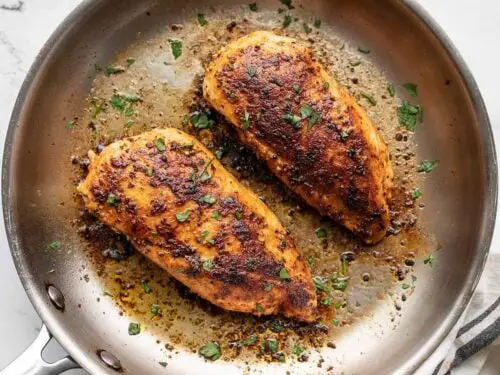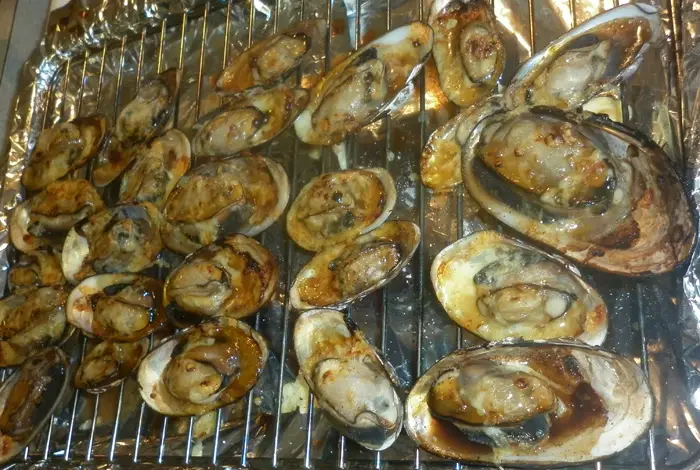Chicken breast is a widely consumed protein source. It can be prepared in various ways, such as grilling, baking, roasting, and boiling. Boiling chicken breast is an alternative option that many people prefer for its simplicity and appealing texture. However, it leads to the question of whether boiled chicken breast gets softer with more boiling time or not.
This article aims to explore this question by examining the scientific process of boiling meat, factors that affect chicken tenderness during the boiling process, benefits and risks of boiling chicken breasts, tips for properly boiling a chicken breast and some great recipes using boiled chicken breasts.
What Happens When You Boil A Chicken Breast?
Boiling is defined as cooking food in liquid at a temperature above 100 °C (212 °F). When you boil chicken breast, the high temperature breaks down the connective tissues that hold muscle fibers together. As a result, collagen in muscle fibers dissolves into gelatin giving meat its characteristic tender texture and moistness.
However, when you cook meat in water for an extended period at temperatures higher than 80°C (176°F), proteins denature rapidly causing the proteins to shrink and squeeze water out of meat making it dry.
Factors That Affect Chicken Tenderness During The Boiling Process
Several factors affect how tender boiled chicken breast becomes:
Chemical Composition Of Different Cuts Of Chicken
Different cuts of chicken contain different amounts of collagen; therefore they require different boiling times to reduce toughness while retaining moisture content.
For example;
- Tenderloin: requires only short cooking time because it contains less connective tissue
- Drumstick or thigh: Contains more collagen hence requires more time to break down collagen but If cooked too long will become rubbery.
Cooking Time
As previously mentioned cooking time is another factor affecting the tenderness level of your boiled chicken. As heat penetrates through the meat fiber structure begins to break down moistening and weakening the bonds between fibers.
- Short cooking time: This will lead to tougher chicken because the boiling process has not broken down enough collagen fiber in the meat making it chewy.
- Long cooking time: This makes it tender but only up to a certain point. If overcooked, your chicken breast will become rubbery.
Temperature Settings
It might be tempting to increase he temperature setting of your stove burner when boiling chicken breast for faster cooking however, you run the risk of overcooking your meat causing dryness instead of moist and tender.
The recommended temperature for boiling chicken breast is 82°C (180°F). Higher temperatures can cause proteins which hold moisture to shrink squeezing out water from meat resulting in dry or rubbery chicken breasts.
Seasonings And Marinades
Seasonings and marinades used during boiling plays an essential part in enhancing the flavors and texture of boiled chicken. However, acidic seasoning such as lemon juice or vinegar may denature the protein molecules making the meat tough.
Benefits And Risks Of Boiling Chicken Breasts
Boiling is popular due to its simplicity and healthiness. Here are some benefits:
Benefits Of Boiling Chicken Breast
Lean Protein Source
Chicken breast is one of the excellent sources of lean protein that play a crucial role in muscle growth, immune function, hair growth, skin repair/tissue recovery among others.
Retains Nutrient Value
Boiling preserves most of the nutrients present in the food since they are not lost in high levels by frying or grilling.
Good For Your Heart
Boiled chicken breasts have less fat compared to other cooking methods such as frying hence ideal for individuals adhering to a low-fat diet. Overconsumption of fats can lead to obesity which also results in health complications like heart disease.
Can Help In Weight Loss
Substituting calorie-dense foods with boiled chicken breast aids in weight loss because it’s a low-calorie meal that provides satiety. This will help you keep full for longer, preventing overeating.
Risks Of Boiling Chicken Breast
Overcooking can lead to safety risks such as dryness and rubbery texture.
Always ensure your chicken is cooked through properly to avoid exposing yourself or others to health hazards that come with undercooked meat. It might be tempting to overcook however, you run the risk of drying the meat out resulting in a rubbery texture.
May Contain Bacteria Before Cooking
Raw chicken breast may contain bacteria that increase the risk of food poisoning if it is not handled safely and cooked correctly.
Tips For Properly Boiling A Chicken Breast
Here are tips on boiling your chicken breast to make it tender:
Preparation And Cleaning Steps
- Rinse thoroughly: Ensure you rinse the chicken breast under running water before cooking.
- Trim off any excess fat: Cut off extra skin/fat since they can add extra calories to your meal.
- Pat dry: use paper towels or clean kitchen cloth to dry up all moisture from your chicken breasts before seasoning and cooking
How Long Should You Boil Your Chicken?
- Small, boneless, and skinless pieces (tenderloin): Should boil for approximately 6-8 minutes
- Medium-sized firm pieces: Should boil for approximately 15 -20 minutes
- Large-sized frozen/uncut chicken breasts should boil for around 25-30 minutes
Ideal Internal And External Temperature For Perfect Boiled Chicken Breast
To determine whether your boiled chicken breast is ready or not;
- Use a thermometer; stick the tip of the poultry thermometer at an angle into one of the thickest parts around halfway into your cooked meat this should read 75°C (165°F) when done.
- Slice open moist white pork meat should appear and juices flow clear plus no signs of pink at all.
Great Recipes Using Boiled Chicken Breasts
Here are two easy boiled chicken breast recipes:
1. Easy Boiled Chicken Salad Recipe
Ingredients:
- 1lb. boneless, skinless chicken breasts
- Salt and pepper to taste
- Chopped fresh parsley
- Minced garlic cloves (2 cloves or more)
- Mayonnaise (one tablespoon)
- Whole wheat bread for serving
Instructions:
- Boil the chicken using the steps outlined above.
- In a separate bowl, mix mayonnaise, garlic, salt and freshly ground black pepper together.
- Once the chicken breast is cooked and cooled down, cut it into small cubes.
- Toss in some freshly chopped parsley followed by your mayonnaise dressing & pass on whole wheat bread for texture.
2. Boiled chicken with Veggies Recipe
Ingredients:
- Fresh Chicken breasts (Whole or Cube Shaped)
- Olive oil – One Tablespoon
- Salt to taste
- Black Pepper Powder – half a teaspoon
- Veggies such as carrots, cauliflower, bell peppers
- A cup of sliced onions Instructions:
- Rinse your veggies then chop them into bite-sized pieces along with onions.
- In a suitable pot heat water until it starts boiling and add your chicken breasts in for cooking.
- Add olive oil, black pepper powder & salt to make the dish flavorful during cooking.
- Add chopped vegetables after about 15 minutes of earlier simmering then continue heating them till they soften up & have soaked flavors from boiled meat for around five minutes or so.
Conclusion
Boiling chicken breast can be an excellent alternative to grilling, baking, or roasting family meals; boiling breaks down connective tissues that hold muscle fibers together leading to gelatin formation hence increasing tenderness and moistness. For the best outcome, ensure you prepare and clean appropriately, determine the correct boiling times/temperature, perfect your seasoning and marinades, and avoid overcooking. Include boiled chicken breast in your meal plan and get to take advantage of its nutrient values.
Q&A
- Can boiling chicken breast make it more tender? Yes, boiling chicken breast can help break down the tough fibers and make it softer. The longer you boil it, the softer it will become.
- How long should I boil chicken breast to make it soft? It depends on the size of the chicken breast. Generally, a small chicken breast will take around 15-20 minutes to cook, while a larger one may take up to 30 minutes or more.
- Is boiling chicken breast the best way to cook it? Boiling is just one way to cook chicken breast. Other methods, such as grilling or baking, may produce a better flavor and texture depending on your preference.
- Does adding salt to water while boiling make chicken breast softer? Adding salt won’t necessarily make the chicken breast softer, but it will enhance the flavor and make it taste better. Just be careful not to over-salt the water as this can result in an overly salty dish.

